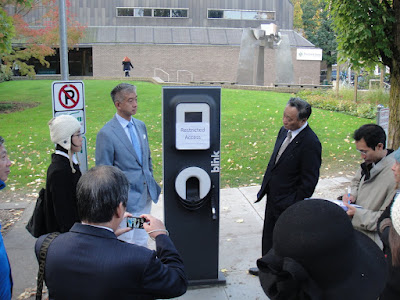First Stop Portland Student Ambassador
Even before the earthquake of spring 2011 rocked Japan's confidence in nuclear energy, leaders in the Toyama prefecture were actively promoting a low-carbon "Eco-Town" model based on compact development, renewable energy sources, increasing citizen participation, and expanding light rail transit. During a recent visit celebrating the 20-year anniversary of the Toyama prefecture's sister state relationship with Oregon, Toyama Vice Governor Koichi Uede spent the morning learning about the new Electric Avenue test site on the Portland State University campus.
 |
| Vice-Governor Koichi Uede checks out PSU's Electric Avenue |
Sounds like a great idea, the delegation observed, but will it work?
The delegation was delighted to see a working model of a public electric charging station, however they were concerned about the practicalities of Oregon's EV policy, questioning whether electric vehicles are a feasible alternative for the region. The answer they received was surprising: although Electric Avenue is only a test site, the usage during the first months of testing were above projections. The delegation thought the charging stations had been in use for quite some time. Likewise, the Portland presenters were surprised to learn that EV charging stations were not as ubiquitous in Japan as they thought.
The delegation questioned the wisdom of implementing electric vehicles if the electricity being used comes from non-renewable resources. Furthermore, how will EV work in the rest of Oregon, apart from the urban density of the Willamette Valley?
From Portland's perspective, it makes sense environmentally and economically. It is more cost effective in the long run to operate an electric vehicle than one running off of gasoline. In addition, despite some reliance on fossil fuels for local electricity, it is still a local product, contributing to a local economy, and reducing local reliance on foreign oil imports. For EV to be environmentally sound however, future plans for renewable electricity sources need to be implemented.
The delegation seemed enthusiastic about Electric Avenue's potential as both a demonstration project and educational site and left the tour discussing plans for a similar site in Toyama. It will be interesting to see what role Electric Vehicles play in Toyama's policies in the coming years and what role this visit to Portland has in their development. The exchange of knowledge and information is key, and can help cities learn from each other and work on solving problems like global climate change together.

No comments:
Post a Comment